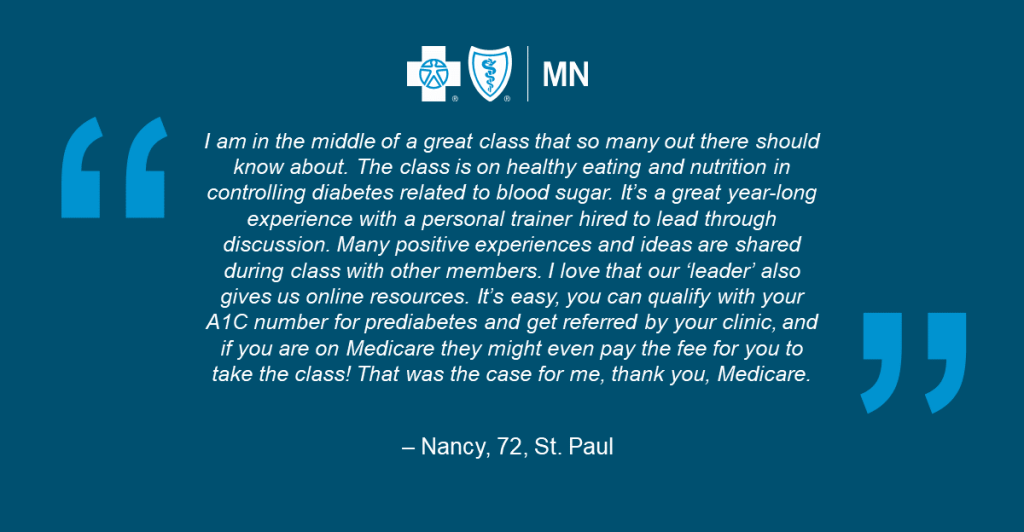Diabetes prevention programs help people steer clear of an unwanted diagnosis
March 13, 2024Diabetes Alert Day, as observed by the American Diabetes Association, is Tuesday, March 26, 2024. The day is meant to serve as a “wake-up call” that focuses on the seriousness and risk of the disease.
While 37.3 million Americans have type 2 diabetes, approximately 98 million more are considered prediabetic – where blood sugar levels are higher than normal, but not high enough to be officially diagnosed. Adding to the direness, eight in ten adults living with prediabetes are unaware of their condition, according to the Centers for Disease Control and Prevention (CDC).
While these statistics are staggering, prediabetes can also be described as “the best bad news a person can get,” due to its reversible nature.
 Diabetes prevention programs (DPPs) are a proven and effective way to keep a diabetes diagnosis at bay by reversing the condition through learned healthy habits. And what’s better, the cost of these programs may be covered by your health plan.
Diabetes prevention programs (DPPs) are a proven and effective way to keep a diabetes diagnosis at bay by reversing the condition through learned healthy habits. And what’s better, the cost of these programs may be covered by your health plan.
The Blue Cross network includes DPPs offered by providers such as Omada and Trellis and through a variety of host locations including hospitals and clinics, YMCA chapters, Area Agency on Aging locations, and county and tribal public health services.
The programs have historically been available through Medicare and Medicaid at no cost to members. In 2024, Blue Cross has expanded no-cost access to fully insured commercial members as well, beginning upon plan renewals for the year.
As explained by Blue Cross’ chief medical officer Dr. Mark Steffen, “Without intervention, 29 percent of our members who are prediabetic today will develop type 2 diabetes in three years. Avoiding that onset means significantly lowering a person’s risks of heart and kidney diseases, blindness and other significant health problems. The stakes are very high, and we don’t want cost to be a barrier to the value that DPPs provide.”
The national DPP curriculum is a CDC-recognized way to prevent or delay a type 2 diabetes diagnosis for those with prediabetes. The program is a 12-month commitment, offered both virtually and in-person within local communities, where participants are taught to take small steps to increase physical activity, eat healthier, manage stress and address other factors that contribute to the development of type 2 diabetes through sessions led by a trained lifestyle coach.
The goal for each DPP participant is to lose at least five percent of their body weight by the conclusion of the program, fostered by the ongoing support of others going through the program. DPPs are proven to reduce the risk of type 2 diabetes by 58 percent (71 percent for participants aged 60 and older), according to the New England Journal of Medicine.
“For the reasons above, we want Diabetes Alert Day to be about prediabetes just as much as those living with an official diagnosis,” added Dr. Steffen.
The expansion of the benefit at no cost share from Medicare and Medicaid to commercial members reflects the Blue Cross commitment to population health, which has immense impact on the overall affordability of healthcare, while also easing the burden for those affected with diabetes and prediabetes. In 2020, Blue Cross also implemented a $0 insulin copay for members on its fully insured plans.
In fully insured commercial plans, Blue Cross sets the plan benefit design and covers eligible healthcare claims. This differs from what are referred to as “self-insured” plans, where Blue Cross administers benefit plans designed by large employers with, in most cases, a workforce located throughout the country. Many self-insured do choose to offer no-cost DPP coverage. Members should reference their individual benefit plan or call customer service to learn more.
For information about eligibility requirements, resources and support through Blue Cross, visit bluecrossmn.com/diabetes. To find an in-network CDC-certified DPP provider, visit https://www.cdc.gov/diabetes/prevention/find-a-program.html.
In her own words: A member perspective on diabetes prevention



